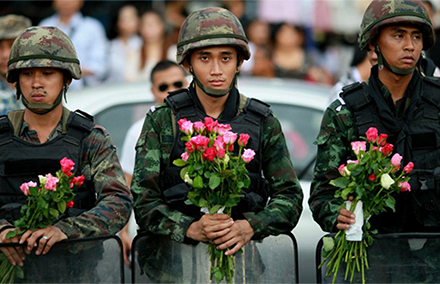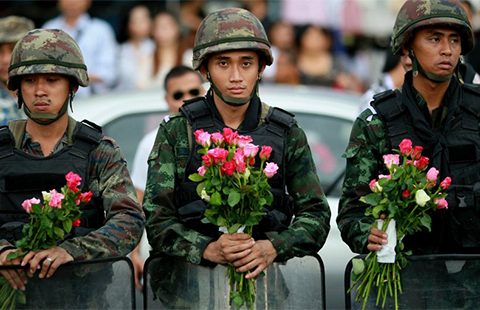
Can the people and the army come together to remove the ‘Absolute Monarchy Dictatorship’?
Thailand will never achieve democracy.
No matter what constitutions are used, no matter what government the country has, no matter whether that government is appointed or elected, no matter what kind of leader leads, and no matter what theories proposed by political pundits are used; these will all fail to achieve democracy in Thailand unless the present system of governing is dispensed of.
According to Chupong Teetuan of NorporchorUSA, Thailand needs another system of governance based on the following elements: absolute power belongs to the people, there is liberty and equality for all, the same rules of law apply to all, and there is an elected government.
Mr Teetuan has been preaching this concept for years, but I first heard him when he and political activist Woodside did a talk show, A way out (of crisis) for Thailand, in the early days of NorporchorUSA when Woodside was alive and well. The talk show is still running strong today.
Chupong says that Thailand’s model of government is similar to Japan and England in the sense that it is a parliamentary system with a monarchy. The difference is that theirs are democratic but Thailand’s is not.
He calls the Thailand system of governing an ‘Absolute Monarchy Dictatorship’. No government can practice reasonable democracy under this system. This is because no one can be more popular or powerful than the king, and truth and reconciliation among different political factions cannot be achieved.
Of course Bhumibol did not achieve this absolute power overnight. He got help from his uncles, the sons of various wives of his grandfather. Starting from the end of World War II, the remnant princes shrewdly and subtly recomposed the state and culture around the throne, just as in absolutist times. With Bhumibol as their tool, they made the throne’s interests paramount over those of the state.
Attacking not communism but the rise of liberal democracy, they entered alliances with anyone who would advance the palace’s power; from brutal army bosses, drug dealers, and exploitative bankers and business monopolists to the US government and the CIA. Each in turn tapped the throne’s support for its own ends (as highlighted in The king never smiles by Paul M Handley).
Bhumibol was not only a good student of these princes, but also went on to achieve a phenomenal amount of power. A lot of his power was gained after Prime Minister Sarit Thanarat came into power in 1957.
Of course Bhumibol’s power peaked during the popular protests of ‘Black May’ 1992 and after the people saw pictures of Army Chief and Prime Minister Suchinda Kraprayoon and former general and activist Chamlong Srimuang prostrating themselves in front of him.
Chupong also says Bhumibol has three favourite sons to do his work for him.
His first son is the Thai army. Over the years he has learned to take control of this lot. His second son is the judiciary. All judges are appointed by him and have to swear allegiance to the throne.
The third son is the Democrat Party, which is not very democratic at all. This lot does his dirty work in parliament, making laws to suit his desires. They can even throw pamphlets, manhandle the house speaker, strangle anybody and the parliament police cannot touch them.
With the kind of power these scions give him, Bhumibol is untouchable inside and outside Thailand.
There is still hope though. Chupong says there are three possible ways to get rid of the system of Absolute Monarchy Dictatorship.
The first option would see the king voluntarily hand over his power to the people. This is very unlikely. The second would see the masses rise up and demand power be returned to them. This way risks the loss of many lives.
The third would see the people collaborate with the army. Chupong believes there certainly are some liberal-minded officers in the army despite being subjected to brain washing over many years. Obviously communication and collaboration between these soldiers and activists would have to be done secretly.
When the time comes, these soldiers and the people would rise up together to demand that power be returned to the people. Eventually the army would become one with and stay on the people’s side. This way the people would face a minimum risk of loss of lives.
Once the Absolute Monarchy Dictatorship is done away with, the people can choose their own system of governing. But unless this collaboration happens, and the nation follows Chupong’s system of governance, Thailand will never have democracy.
Somchai Rattanakosin is a pseudonym. The author is a Thai national who has lived in Australia for more than 50 years.
 Facebook
Facebook  Twitter
Twitter  Soundcloud
Soundcloud  Youtube
Youtube  Rss
Rss 